
| February 2002 | ||||||
| Sun | Mon | Tue | Wed | Thu | Fri | Sat |
| 1 | 2 | |||||
| 3 | 4 | 5 | 6 | 7 | 8 | 9 |
| 10 | 11 | 12 | 13 | 14 | 15 | 16 |
| 17 | 18 | 19 | 20 | 21 | 22 | 23 |
| 24 | 25 | 26 | 27 | 28 | ||
ARRIVAL CAPE COD BAY
0930 ARRIVAL at Cape Cod Canal sea bouy
1013 LET GO PORT ANCHOR
1030 Finished With MANEUVERING
1040 VESSEL SECURE. 5 SHOTS ON PORT ANCHOR. 3.0 NM FROM SHORE IN 70 FEET OF WATER
Friday 22 February 2002
At 1200, EST the Training Ship Empire State was anchored 3 nautical miles east of the entrance to the Cape Cod Canal. The weather was cloudy, winds from the west at 20 knots, air temperature was 46 degrees Fahrenheit, barometric pressure was 29.77 inches, seas were northeasterly at 5 to 6 feet, sea injection temperature was 40 degrees Fahrenheit. Depth of water beneath the keel was 11.5 fathoms.
CAPTAIN'S LOG
"Nothing in the world is more dangerous than sincere ignorance and conscientious stupidity."
-Martin Luther King, Jr.
Hopefully we won't have any evidence of either as we take final exams today and tomorrow and finish the 6 credit college course that is Sea Term 2002.
For all of you who can not wait another minute to see your loved one... drive on down to the east end of the Cape Cod Canal and wave. WE'RE HEEERE!
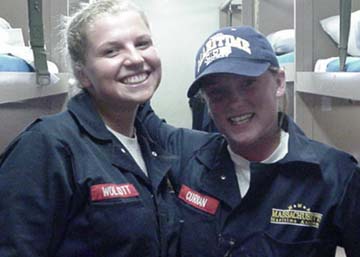
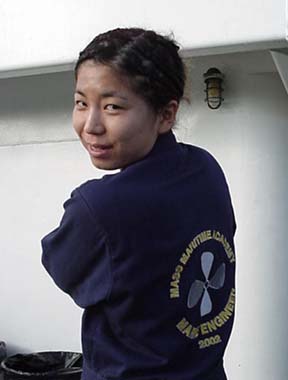
The ride back up the East coast was far less exciting than the E-ticket, X-games ride we experienced at the beginning of the trip. We hit a few bumps off Hatteras and moderate seas off Long Island early yesterday, but for winter in the Atlantic, no one is complaining. We were pushed along by the mighty Gulf Stream and arrived a day early. Now don't get the idea that our navigation is so haphazard that we are only accurate to plus or minus 24 hours on ETA's. Anchoring for the last day or so of sea term has become a tradition at MMA. With the highly unpredictable weather in New England, we like to have a day up our sleeve if the fog sets in or the winds pick up. We all realize that coming in right BEFORE a storm would be infinitely more pleasurable that waiting it out at sea and coming in a day LATE!
While snow or rain won't have much of an effect on the tempo of operations, rough seas for the last two days, when final exams are administered, can be the ruin of weeks of hard work by some cadets still susceptible to mal de mer. It also allows us to free up as many cadets as possible from the watch bills to take the tests. (You don't need as many lookouts, water tenders, messengers, navigators, etc. if you are stopped and anchored.) It also allows us to spend all available resources on a general sweep down and clean up of the ship.
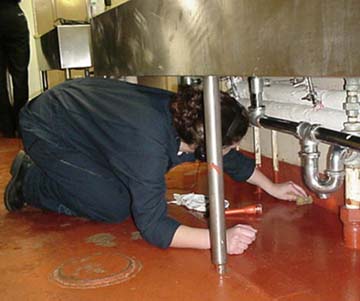
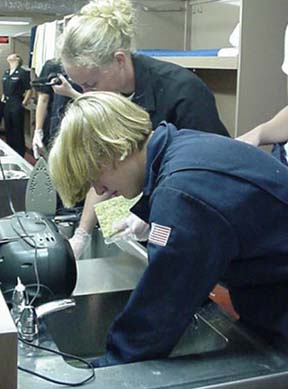
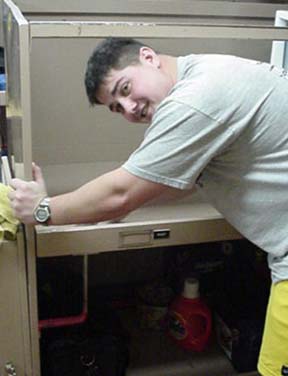
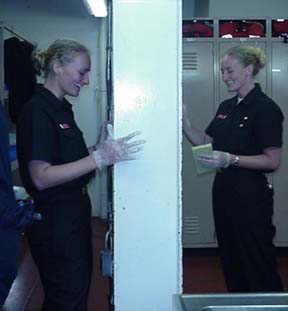
Because classes are over, cadets can now pack all of the gear going back to classrooms and labs at MMA . After tonight's final Captain's Inspection, they can also organize their own gear for rapid deployment on Sunday.
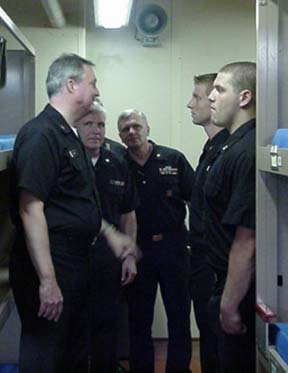
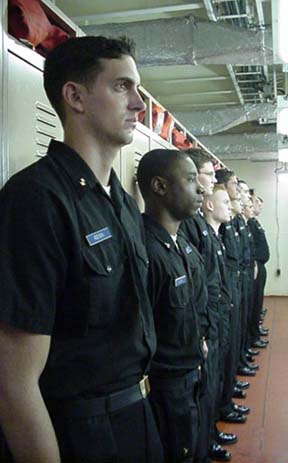
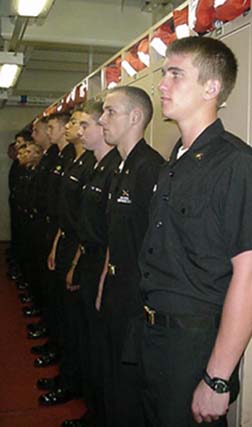
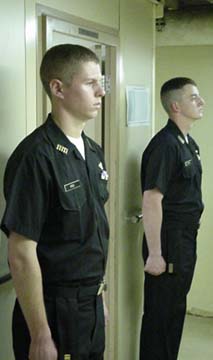
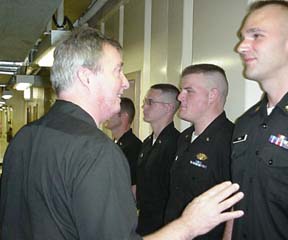
Hanging here on the hook, in sight of home, can be very frustrating for the youngies aboard. Despite the cold, 4/c cadets are perched on the lee rail like flocks of starlings, all facing the same direction; the entrance to the canal. As we swing on the anchor, a pendulum to the tidal ebb and flow, cadets reposition to keep their view of the Sagamore Bridge... or to keep cell phone contact. I think if the entire fourth class came up on deck and focused their telekinetic power, this ship would be instantly transported to the MMA campus without engaging the engines or using a tug. They are that anxious to get back.
I keep reminding all that, when I was a cadet, MMA used to run summer sea terms of 70+ days duration. This sea term is barely a trip on Noah's ark - just 40 days and 40 nights. They look at me as if I had two heads. "Sure Captain, did you have sails back then?"
I respond that actually, in the days of MMA sailing ships, the sea terms lasted 6 months or more! I might as well be speaking in tongues. The majority of the fourth class cadets aboard are convinced they have endured tremendous hardships during this sea term. Storms of the century! (one gale that lasted 24 hours) Ship wrecks! (one wayward sailboat, safely turned over to Naval Authorities) Hazardous living conditions! (156 men in a confined space) Hostile natives! (taxi drivers in Ponce and 156 men in a confined space) Facing certain starvation! (no care packages from home due to new customs regs.) Of course, next week when they talk to their friends who have the misfortune to go to an ordinary college, I suspect the story will have a different spin.
"There I was, on the beach in ----------, surrounded by ------, sipping on a ------. (fill in the blanks). What a great time we had! I could have stayed out there forever! "
See you tomorrow, from right here in your backyard.
CADET'S COMMENT
by 1/C Caryn Arnold
Cadet excitement hit a high water mark yesterday. You see, at every fire & boat drill, the Navigator announces to all hands the direction and distance to the closest point of land. The purpose is to inform the lifeboat officers of their expected course of action after the lifeboats are launched and clear of the ship. Ordinarily, the announcement is met with indifference. We know this is just a drill and we know we won't be setting sail in our lifeboat for the spot specified any time soon. Yesterday, however, was very different. Yesterday the pipe was made that the closest point of land was Nantucket Island, bearing 318 degrees magnetic, 130 nautical miles. Smiles broke out on everyone's face! We are almost home!
The classes are done, the tests are today and tomorrow. The ship has been stripped, waxed, painted, and is in better shape than when we received her. There is one more Captain's Inspection tomorrow and then all the cadets can start packing their personal belongings. Many cadets will lay restless in their rack for two nights awaiting the return trip down the canal on Sunday. We have all come to realize one of life's great truths: No matter how many ports you have been to... homeport is still the best! There is nothing better, than to see the crowds of people who miss you, love you and can't wait to see you again.
The big question yesterday was, "When will we be in CPR?". I am not talking about Cardiovascular Pulmonary Resuscitation. To the Cadets aboard TSES, that acronym means "Cell Phone Range".
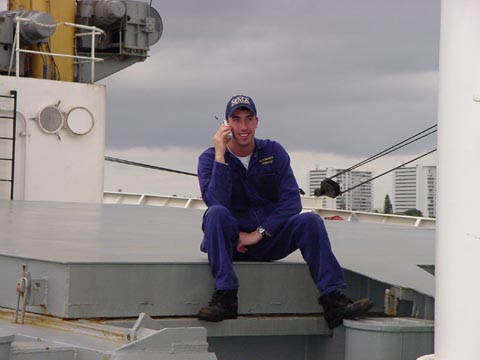
The cell phones are all active now and I know I really don't want to see my phone bill for these past two months. It seems everyone aboard is reaching out to touch someone dear... and I imagine the phone company will charge dearly for this contact. Another question I heard in my travels around the decks was, "Why do we have to anchor, can't we just go in early?" I tried to explain the necessity of sea time for Coast Guard licenses, the fact that we have not finished the tests or the clean up, and the importance of schedule and routine. Their eyes just glaze over. They are so close they can see it, smell it and almost taste it. Logic and reason are wasted on them. Nothing is worse than to see home knowing you can't get off the ship. One and a wake up. We'll be home soon!
ANSWERS FOR FRIDAY 22 FEBRUARY 2002
MATH: This is a trick. The answer is not 5 knots. The Officer of the Watch used 3 hours to travel the first 12 nautical miles (12/4) and 2 hours for the next 12 nautical miles (12/6). He used 5 hours to travel 24 miles, so his average speed was 24/5 or 4.8 knots.
SCIENCE: GREAT to the Nth Power, THANK YOU FOR SAILING WITH US.
GEOGRAPHY: No matter where on earth they are, they are in the same place. Home!...with YOU!
HISTORY: HISTORY! THE SEA TERM IS HISTORY!...SEE YOU NEXT YEAR!!